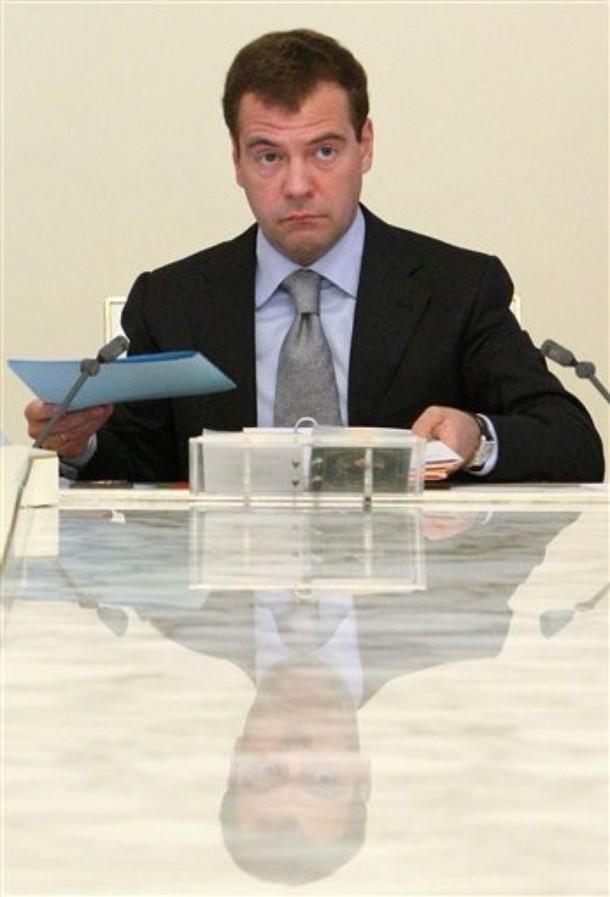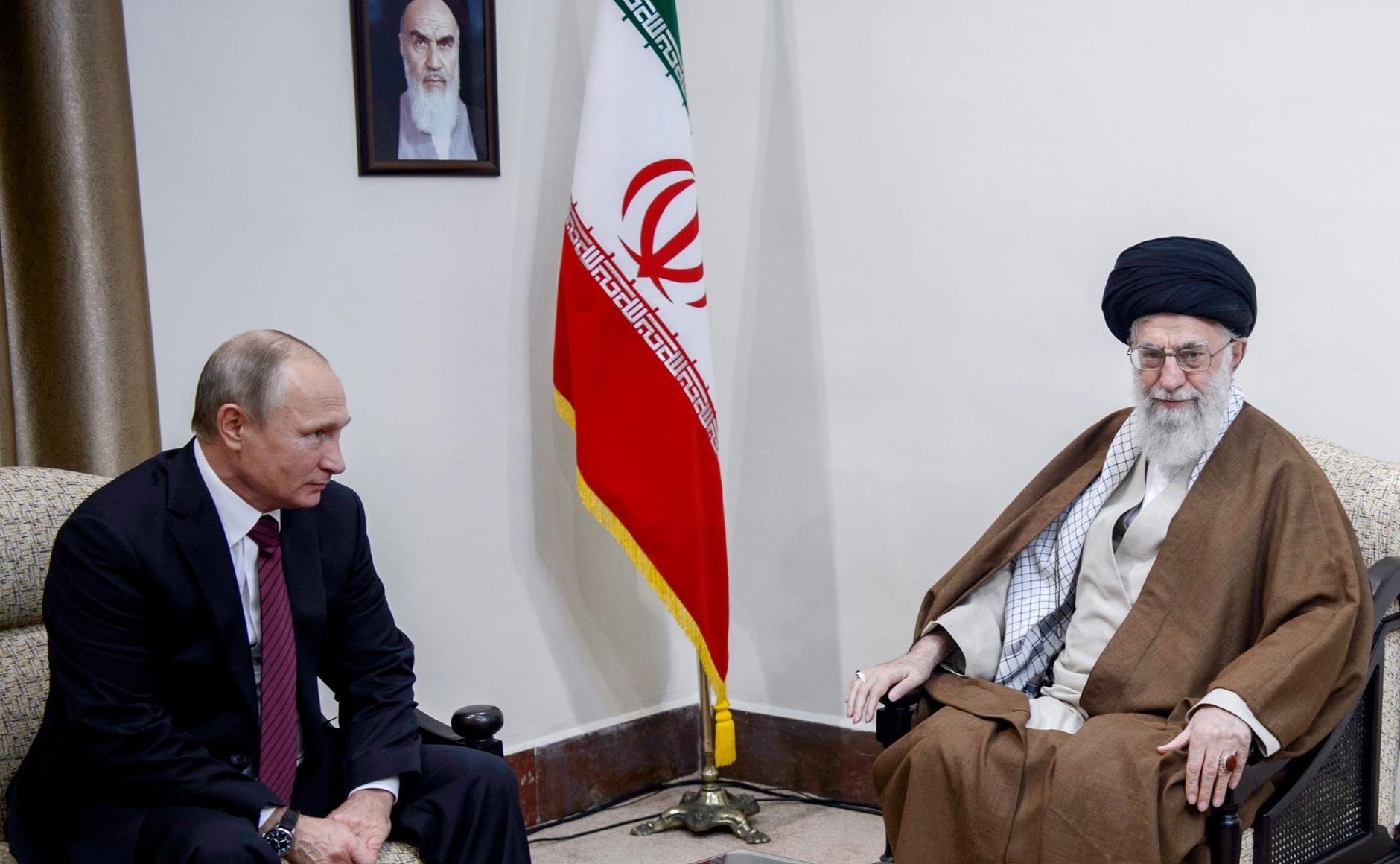
Medvedev Tries to Dress Foreign Policy Setbacks as Achievements
Medvedev Tries to Dress Foreign Policy Setbacks as Achievements
On July 26 President Dmitry Medvedev focused on foreign policy in his carefully staged interview for the NTV channel and duly praised his own successes in improving Russia’s image as a "strong and modern country, pragmatic and restrained." He asserted that Russia "plays a decisive part in the global balance of power" and also acted as a "strong, predictable and comfortable partner for our neighbors." The Kremlin is used to creating a virtual reality by issuing authoritative pronouncements about going from strength to strength, but now this habitual self-deception does not quite work and the setbacks are catching up.
The central part of Medvedev’s July "offensive" was setting a new format for Russia-U.S. relations at the Moscow summit, and he was obviously pleased that President Barack Obama took him very seriously and had only a short working breakfast with Prime Minister Vladimir Putin (Vedomosti, July 20). Now, however, both members of the ruling duumvirate have had second thoughts about whether the visit was really a success, partly since it is very doubtful if a new strategic arms control treaty can be hammered out by the end of the year. Moscow was very comfortable with the pattern when personal relations between presidents were perfectly fine but inter-state relations remained tense. However, the new pattern appears to be exactly the opposite – and this denies the authorities many opportunities to exploit anti-Americanism towards various political ends. Medvedev did not give any promises regarding Iran and Vice President Joe Biden has confirmed U.S. support for Georgia and Ukraine – so both sides are unsatisfied with the much-advertised "reset."
On the European front, Medvedev’s recent visit to Germany appeared perfectly smooth but he has to admit, at least to himself, that the grand initiative about a new pan-European security pact is going nowhere (Nezavisimaya Gazeta, July 21). Relations with Sweden, which has assumed the role of presidency of the E.U., are so tense that Moscow has indicated its preference for organizing the next Russia-E.U. summit not in Stockholm but in Brussels (Vedomosti, July 24). The most irritating setback in European affairs, however, was the inter-governmental agreement on the Nabucco gas pipeline signed in Ankara by the interested parties, which leaves Putin and Gazprom pondering whether to proceed with such an expensive folly as the South Stream project (www.gazeta.ru, July 22; Ezhednevny Zhurnal, July 16).
Relations with China should have reached a new high with the joint military exercises "Peace Mission 2009" intended to demonstrate their readiness to perform joint large-scale counter-terrorist operations (RIA-Novosti, July 26). This show of unity was, however, overshadowed by the abrupt closure of the Cherkizovsky market in Moscow, which served as a semi-legal distribution center for Chinese consumer goods. Beijing has sent a special delegation to sort out the "misunderstanding," and Putin has to face the fact that his methods of "manual management" can bring not only economic distortions, carefully camouflaged by official propaganda, but also political complications (Kommersant-Vlast, July 20).
Medvedev paid particular attention to the "very good and stable" relations with Russia’s former Soviet neighbors arguing against thinking "in terms of who owes what to whom." It is, however, exactly in this neighborhood that the most irritating problems keep upsetting Moscow’s course in consolidating its influence. Minor incidents in Sevastopol involving the Ukrainian authorities and the Black Sea Fleet are nothing new, as are the promises from Turkmenistan to supply some volumes of gas for Nabucco. The scandals with Belarus, which is supposed to be Russia’s closest ally, have reached such an intensity that President Alyaksandr Lukashenka expressed "pain and disappointment" about relations with Moscow, which in his opinion shows the "syndrome of a heavy-handed great-power" (Nezavisimaya Gazeta, July 27). Medvedev’s musing about a "different behavior model" that would depart from the pragmatism upon which Putin sternly insisted can hardly pacify this quarrel.
Some of these setbacks might be attributed to Medvedev’s lack of experience in foreign policy and to the weakness of his position as a co-ruler hand-picked by Putin who is obviously not going to grant him all the control that a president is entitled to (www.gazeta.ru, July 23). This weakness of leadership is massively aggravated by Russia’s unstoppable plunge into the quagmire of economic recession, which Putin tries to arrest by micro-managing local crises and Medvedev hopes to talk out of existence by repeating instructions on innovation and modernization. Few pro-active anti-crisis measures, for instance in cleansing the banking sector, are being implemented while new promises for increasing pensions are issued in order to curb growing discontent (www.newsru.com, July 24). The government is now finalizing the draft budget for 2010, and has no better prospect than to preserve the outline of the current one, with the same 30 percent gap between income and expenditures (Vedomosti, July 27).
It is this inescapable decline that determines Moscow’s clumsiness and nervousness in the international arena, and that is exactly why the Kremlin is so upset with Biden’s precise -even if not entirely politically correct- diagnosis of Russia’s weakness, which inevitably involves a whole range of consequences from arms control to conflict with Georgia (Ezhednevny Zhurnal, July 27). Medvedev’s key foreign policy aid Sergei Prihodko even expressed doubt about Obama’s control over setting U.S. foreign policy guidelines, also reminding him about American responsibility for triggering the global financial crisis (Kommersant, July 27). Apparently, Putin’s team, on which Medvedev still heavily relies, assumed that "reset" implied the readiness of the new U.S. administration to correct the mistakes of the George W. Bush years – but never thought about the need for Moscow to cover any part of the road to "friendly and mutually beneficial" relations with the U.S. The truth is that reckoning with reality is beyond Medvedev’s freedom of maneuver as defined by his senior partner – who is not simply stuck with one foot in the "old ways" but is probably incompatible with the new ways leading away from curtailed democracy and corrupt paternalism.


